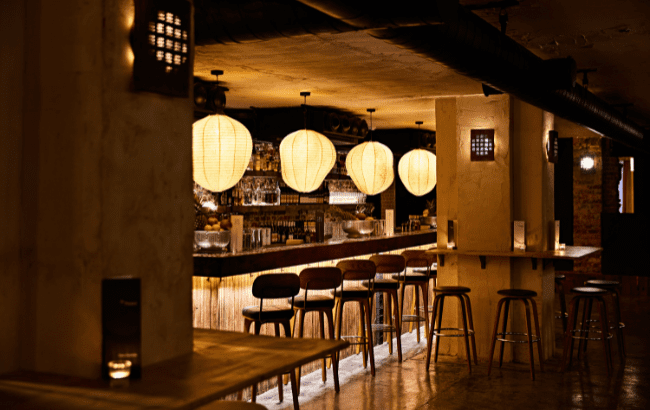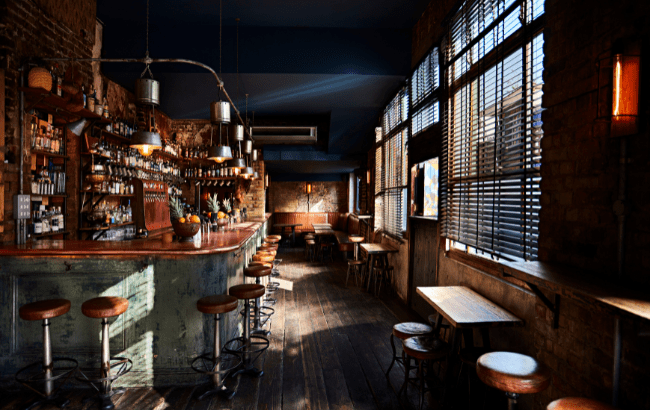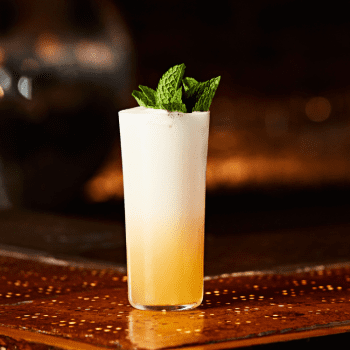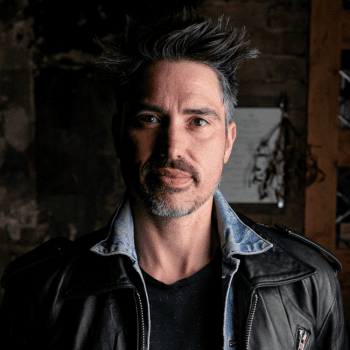Andy Kerr: how bars can survive and thrive in London
By Rupert HohwielerLondon hospitality veteran Andy Kerr talks to us about juggling five bars, the opening of his latest venue, Parasol, and what it takes to succeed in a cutthroat market.

As the number of licensed London venues continues to dwindle, Andy Kerr is going against the current by bringing more to England’s capital.
Kerr, a bar-owning veteran who already operates a number of venues in London under his hospitality collective the Umbrella Project – including Discount Suit Company, The Sun Tavern and Umbrella Cider House – recently added another to his stable in the form of Parasol in Dalston.
On top of that, even though he’s just opened a new bar, Kerr has his sights set on more, as he reveals to The Spirits Business.
“Always thinking mate, always, obviously at the moment it’s about getting Parasol where it should be, but there’s a couple of things maybe in the pipeline and I think Parasol can be a rollout concept as well. So, perhaps Parasol Soho at some point in the future,” he alludes.
Kerr opened Parasol in east London earlier this spring with pal Tom Gibson, whom he met when designing the cocktail menu for the now shuttered Ruby’s. Kerr is familiar with the east as all his bars are located in close proximity to one another in the area.
“East London is a really good opportunity,” he says, “because it’s cool, it’s diverse, and you can do something quite small, so the rent’s not huge.
“Fifteen years ago Dalston used to be really vibrant and then obviously all the licences were cut and stopped everyone going there, and it all died. I think it was realised that it’s such a great place to have a diverse nightlife culture. Honestly, if you walk down the streets now, you can’t even move, it’s that busy. There are so many venues open quite late, so it is a real hot ticket at the moment. So that’s why I’m quite excited about Parasol.
“It’s weird, I was there 15 years ago and with people now saying, ‘oh, it’s the new thing’, well, it did used to be – I’m showing my age a bit now…”

Parasol
Parasol presents his biggest venue in terms of size, which comes with a new set of challenges. But, with more than 25 years in the industry under his belt, he’s well-versed in what works and what doesn’t.
With his other venues limited by their smaller sizes, Kerr is hoping to bring more late night action (i.e. dancing) into the fold at Parasol, considering the space he has at his disposal – the capacity is in the hundreds – which can also give punters more of a reason to not only visit, but stay.
Kerr’s venues are typically classic cocktail-based, turned up a bit with their own style, but for Parasol he was looking to have a bit more fun with the drinks.
“We have a slight, I don’t want to say theme, because theme bars are mostly terrible, but with disco. So let’s get interesting 70s and 80s classics on the menu and put our riff on them,” he notes.
“Take the June Bug – when I started bartending in 1999, there was a June Bug on the menu, the original June Bug – our version now is different (here with Takamaka Overproof Rum, Yellow Chartreuse, pineapple, banana, melon, coconut and lime) and people are really surprised. I think it’s nice to be able to have a bit of fun and sometimes not be so serious.”

Kerr complements these drinks with DJs who spin a soundtrack that was referred to on a press release for Parasol to as “esoteric selections based around heady 1980s NYC style mutant disco”.
On finding the sweet spot between good drinks and the dance floor, he says: “A few years ago, my ex-girlfriend came to London. She was living in Mexico, where I met her, but she’s American, and I asked her ‘what do you want to do tonight’? She said: ‘I want to have great cocktails, dancing, and loads of fun’, and I actually struggled to think of somewhere – so that was always in the back of my mind.
“Why can’t you have both? It’s either a club vibe with pretty basic cocktails, or the other way around where it’s a high-end venue that’s about the cocktails. In between, there’s nothing that involves the two, so that’s what I wanted to explore and try to do with Parasol.”
Kerr has also been doing floor shifts to gauge reactions for himself, which he says have been amazing. “I just had so much fun, but it’s actually also really hard to be honest because you’re taking orders at the table and you go back with the drinks and they’re actually all on the dance floor.”
Parasol is currently only open from Thursday to Saturday with a view to add Wednesday after summer. The weekend-only hours are to build the venue up, work out points service and ultimately concentrate on nailing everything down first, and because the 10pm licence on Sunday means it’s also not worth it on that day yet.
Three of Kerr’s other venues are open five days a week though, and this network where none of them are too far away from each other means his regulars can jump from place to place.
He says: “They’re all similar vibes, the cocktails are actually within the same sort of criteria. So if you like the cocktails at Discount, you’re going to like the cocktails at Sun Tavern or Parasol or Umbrella Workshop. People are very happy to have an alternative, basically, and that is the positive of having multiple venues – you can do that.
“There are people there who’ve come down, who don’t know who I am, but have gone ‘oh, we just really love Discount Suit Company, I actually really wanted to come here, too’. Ten years on, we have a really loyal customer base who like to go between all the venues and it’s really good to see. That’s why it’s so good to still be able to do some shifts and get involved because it makes it all worthwhile. You sort of forget why you’re doing it in the first place – and that’s the reason why, isn’t it?”
Parasol is also a subterranean bar, and Kerr recognises that opening in a basement when the weather’s hot “is sometimes not the best thing to do”, but he contends “we’re lucky to have from the start regular clientele and people who are really interested in the space and the venue”.
Surviving in London as a bar operator
Reflecting on the tough times the industry in London has fallen upon, he acknowledges the situation is concerning: “I’ve always loved London because of the diversity and the creativity, and in my opinion the London bar scene has always been the best in the world, but it’s worrying me a little bit because it’s good to have independent competition.

“What I’m worried about is people either closing down or being put off from opening up. I’ve been in the industry 25 years, but I really love it when young people start their own bar and you visit for the first time and go ‘wow why have we never thought that’.
“I’m worried that not now, but in five years time, it’s going to be stagnant. I need creative young people to give me a push as well, you know?”
He adds that the operating environment for small businesses isn’t making it easy for anyone.
“Why open your own bar when you can be an operations manager for a hotel group on £100,000 a year or something,” he says. “So, you’re weighing it up aren’t you. In the old days, previously, you go ‘OK, let’s do this’, and you can make money, you can thrive, you can improve the economy.
“That’s not happening now, so it is a little bit worrying – but I’m sure we’ll get through this. You’ve just got to keep going. It could be worse… but it could be better, really.” Looking at the positives, he believes the people still passionate about opening bars, will continue to do so.
“Everyone has to support those bars. I always support new openings and creative people in any industry, to be honest. It’s less than it was before, but I really believe we’ll get through this and there’s more to come and the good operators will still still be there – and that’s the most important thing,” he adds.
In terms of priority, for Kerr it’s vibe first and foremost: “It’s about a number of things. Atmospherics are the number one, you can have a bar that just sells Malibu and Coca Cola. If the atmosphere is right, people will come. The music, lighting, everything is so, so important; how it smells, how it feels, every sense must be number one. That’s the most important thing.”
Kerr is hands on with bar design and does much of it himself, repurposing and reusing items and furniture, such as cheesemaking boards for the tables and malting tiles for the bar at Parasol.
“I build all my bars myself and so the finish probably isn’t as good as some others bars, but it’s not just about that,” Kerr says.
“Because we’re doing it ourselves, we spend a lot less money than using a firm, which is another advantage. And if you’re independent it looks really individual and with lot of bars you go into, you can see exactly where they got it from. It looks great, don’t get me wrong, but it’s my sort of look and that’s part of it.
“It’s also about recruiting the right style of staff. You want engaging personalities and diversity – it makes everyone feel involved.
“If you don’t get those things right, there’s no point in having this amazing cocktail programme because it just doesn’t work.”
Related news
